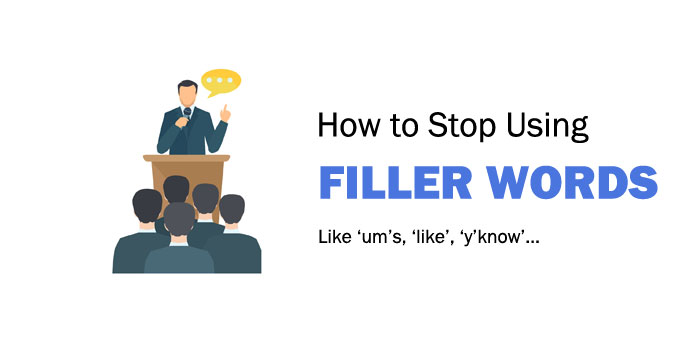How to Stop Using Filler Words (Such as um, like, y’know)
Do you find yourself saying so, like, right, and um a lot during a formal speech?
In conversation, we often use filler or crutch words that may sound informal or less meaningful. Also, such a way of speaking may sound redundant to the audience, especially during seminars or presentations.
Although, when used occasionally, it might not make a dent in your speech, excessive use of filler words can reduce your ability to communicate fluently. So, you should learn to avoid these words and phrases and speak with greater authority.
Similarly, relying on too many ‘like’ and ‘um’ will interrupt the flow and devalue the points you’re trying to make.
What Are Filler Words?
We can define filler words as empty words or phrases like ‘so,’ ‘like,’ ‘yeah,’ ‘um,’ and ‘uh’ that don’t contribute to the sentence. However, these words can give you the space to construct your next line.
Thus, filler words are tiny time-outs we all make when conversing informally. Aside from allowing us some breathing room, filler words herald the next point we’re arriving at. Yet, most people use filler words by accident while they’re coming up with their next argument.

Public speakers must learn to skip these words if they want to keep their audience engaged. We often get rattled during our speech, which implies a momentary lapse in our stream of thought. However, such distractions are bad news in academic speaking.
Although this saves us from saying the wrong words or derailing from the subject, they can become disfluencies or crutches that reduce your message's credibility when overused.
Why Should You Avoid Using Filler Words?
When we use excessive empty words during a speech, the target audience may find it difficult to understand us. If you must effectively send your messages across, learn to engage your audience by rapidly building credibility.
For instance, you don't want to lose your audience amidst a strain of filler words when you share a fascinating or emotional story. Too many filler words are equal to making long pauses in speech.
Hence, frequently stopping to figure out how to wrap up your argument may test the other party’s patience.
During casual discussions, people use a ton of fillers and expect to hear a lot of fillers as well. However, public speaking is quite different in that regard.
Holding the mic amidst a group of people should lead to fluently presented educational essays. So, the use of ‘like’ and ‘um’ is all but prohibited during public speaking that demands fluency.

Granted, achieving such discipline takes time since we are all far more comfortable using an informal tone when speaking. Also, some people feel pressured or nervous when given a microphone and depend on filler words to create some space.
To market a message successfully to an audience, you should make your speech easy to follow, logical, and clear.
Have you wondered why you don't speak fluently? Some researchers have suggested that we often verbalize our hesitations or indecisions because we have learned to fill the silence with words.
For instance, we can hold onto awkward conservation with ‘ah’ or ‘umm’ to find the next thing to say.
How to Stop Using Filler Words
These are several simple techniques to eliminate filler words from everyday conversations. At the very least, we can work on how to sound more natural when addressing a larger group of people.
Here are some practical starting points for a better flow:
1. Don’t Rush
Glossophobia is a common issue for people new to public speaking. It manifests as a visible struggle to find the right words or arrive at a point. While dealing with these psychological or physiological symptoms, we often worry and try to speed up.
When we rush, we end up adding more filler words that further maim our speech. Therefore, we should find a calmer pace to sound natural.

2. Pause as Needed
Professional speakers have mastered the act of using pauses in their conversations. The trick? They insert it strategically, making it look like a natural transition to the next part of the speech.
Also, a pause can help you hold suspense or add gravitas to your deductions. You can take a deep breath and relax before resuming during this short period.
Pause has become a vital part of holding a great conversation with others. However, training yourself to avoid filler words and correctly pausing will take some time.
Therefore, it’s best to practice your speech before an upcoming event. Develop a good flow and learn how to create an opportunity for a pause in your lines.
A pause can help you with the following:
- Collect your thoughts: When you pause, it helps you regain your thoughts and get back on track. However, you should limit such pit stops to five seconds at the most.
- Rest your facial muscles: Some academic speeches last for hours on end, which requires a lot of stamina. Hence, pausing from time to time is natural and welcome for the audience as well.
- Create suspense: You can use a pause to create suspense when talking about a key point strategically. Additionally, it can help your audience better grasp the punchline.
You might also like: How to Use Pauses in Speeches Effectively
3. Record Yourself Speaking
You should record yourself when practicing your speech or presentation for the best result.
Upon review, you can pinpoint any clusters of filler words. Further, analyze your body language and master how to move during stage presence.
The more you practice with a video recorder (mobile device), you can perfect the act of speaking with an authoritative flow.
4. Practice in Front of Friends
You can learn how to avoid using fillers even by practicing in front of your circle of friends. In addition, you can manage your stage fear that way.
However, you should instruct such an audience to be vocal with their constructive feedback. Another good idea is to ask someone to keep track of the number of times you used fillers.

5. Identify and Replace Filler Words
These techniques can train you to speak fluently and condition you to sound like a professional speaker. You must not judge your performance at this point, and the trick is to pay attention to the number of times you use filler words.
Also, you should note the filler words you often use and the usual patterns. Next, work on creating new passages you use instead of another ‘like’ and ‘um.’ So, you should find creative ways to eliminate such words from your normal vocabulary.
At the same time, you can study how professional speakers address their audience on stage. You can learn how and when they allow themselves a pause or the occasional humorous line.
6. Improve Your Vocabulary
When you improve your vocabulary, it becomes easier to avoid using fillers. Having a richer word bank can aid both your writing and speaking skills.
Also, you’ll become more confident when constructing an argument. Aside from reading more, you can also hunt for new synonyms by inspecting a dictionary.
7. Practice as Much as Possible
The right approach to mastering public speaking is to approach it as any other noteworthy skill. So, practice makes perfect.
In time, you can build great presenting skills and learn how to keep your audience engaged with your body language and speech.
Aside from improving the flow, practicing your speech can help you overcome nervousness and stage fear.
Though some might feel right at home when given the mic, the majority treat public speaking as a learned skill.
Conclusion: How to Stop Using Pause Fillers
Learning how to stop saying like and um is a significant step toward improving as a public speaker. Start with improving your vocabulary and try out other common tricks like pausing, recording yourself, and even asking your friends for help. Form a healthy communication habit devoid of fillers when you practice before your speech.
